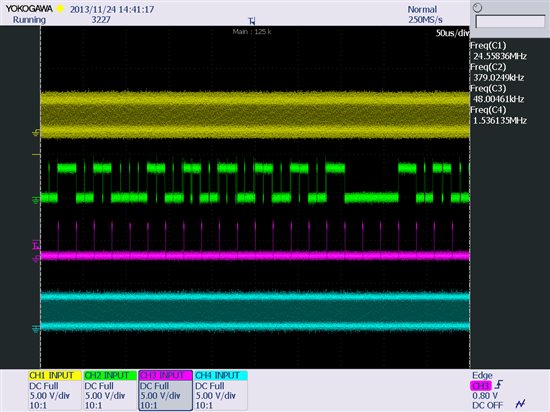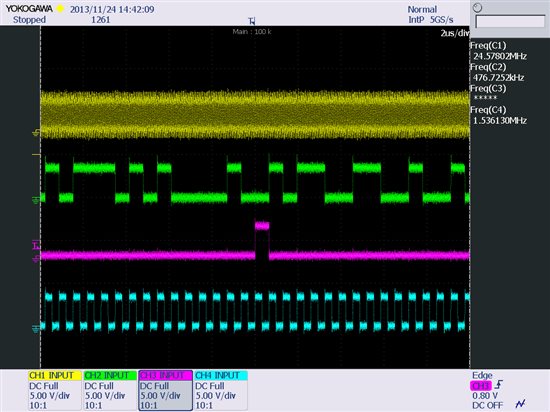Hi,
I have a design centered around an AM1808 which is laid out using McASP0 to interface to a TLV320AIC3100. Up to this point I've been able to use the existing davinci-evm.c and davinci-mcasp.c SoC modules with slight modifications to get data out of the AM1808 using aplay to playback a wave file. I've based my own board file off of the existing board-da850-evm.c file which registers the davinci-evm.c, davinci-mcasp.c and tlv320aic3x.c modules such that aplay sees a sound card. I've been modifying the tlv320aic3x.c driver to control my tlv320aic3100 and have come to a point where I believe I have all registers set appropriately for playback out of both the speaker and headphone outputs. I haven't gotten to the ADC side of things yet as I'm trying to get DAC outputs going first.
The issue I'm having with the codec setup is that the DAC flag register (page 0 register 37) only shows the Left channel DAC powered on while all the control registers indicate the left and right channel DACs, speaker amp driver and the right and left channel headphone drivers are all powered on.
CLASSD_SPEAKER_AMP(P1/R32): 0x86 Bit 7 indicates class-D speaker amp powered up
DAC_CHN_REG(P0/R63): 0xd4 Bits 6 and 8 indicate right and left DACs powered up
HEADPHONE_DRIVER(P1/R31): 0xd4 Bits 6 and 7 indicate right and left head phone drivers powered up
DAC_FLAG_1(P0/R37): 0x80 Only bit 7 is set indicating left DAC is powered up.
I'm not sure if I'm missing something or not but I'm guessing I need to see everything powered up in the DAC flag register before I'll get any audio out. Is this a safe assumption? Is there a sequence of events that needs to take place which isn't outlined in the datasheet that I might need to follow? I am performing both a hard and soft reset when the driver is probed.
Below are all of my register values read back that I've written to in addition to some read only registers. I'm using the codec as a frame and master clock slave. The master clock rate is 24.576MHz, bit clock rate is 1.536MHz and the sampling frequency is 48kHz.
AIC3X_RESET(P0/R1): 0x0
OT_FLAG(P0/R3): 0x2
INTERFACE_SET_REG_1(P0/R27): 0x40
INTERFACE_SET_REG_2(P0/R29): 0x0
CLK_REG_2(P0/R5): 0x81
CLK_REG_3(P0/R6): 0x1
CLK_REG_4(P0/R7): 0x0
CLK_REG_5(P0/R8): 0x0
NADC_CLK_REG(P0/R18): 0x82
MADC_CLK_REG(P0/R19): 0x81
ADC_OSR_REG(P0/R19): 0x20
BCLK_N_VAL(P0/R30): 0x18
DOUT_CTRL(P0/R53): 0x2
ADC_FLAG(P0/R36): 0x80
NDAC_CLK_REG(P0/R11): 0x82
MDAC_CLK_REG(P0/R12): 0x81
DAC_OSR_MSB(P0/R13): 0x0
DAC_OSR_LSB(P0/R14): 0x20
DAC_CHN_REG(P0/R63): 0xd4
DIN_CTL(P0/R54): 0x2
DAC_MUTE_CTRL_REG(P0/R64): 0x0
AIC3100_LDAC_VOL(P0/R65): 0x0
AIC3100_RDAC_VOL(P0/R66): 0x0
DAC_FLAG_1(P0/R37): 0x80
DAC_FLAG_2(P0/R38): 0x80
OVERFLOW_FLAG(P0/R39): 0x0
VOL_MICDECT_ADC(P0/R116): 0x80
VOL_MICDECT_GAIN(P0/R117): 0x0
L_ANLOG_VOL_2_SPL(P1/R38): 0x80
DAC_MIX_CTRL(P1/R35): 0x44
CLASSD_SPEAKER_AMP(P1/R32): 0x86
SPK_DRIVER(P1/R42): 0x14
HEADPHONE_DRIVER(P1/R31): 0xd4
L_ANLOG_VOL_2_HPL(P1/R36): 0x80
R_ANLOG_VOL_2_HPR(P1/R37): 0x80
HPL_DRIVER(P1/R40): 0x36
HPR_DRIVER(P1/R41): 0x36
ADC_PRB_SEL_REG(P0/R61): 0x4
MIC_PGA(P1/R47): 0x0
MIC_GAIN(P1/R48): 0x30
AIC3100_MICBIAS_CTRL(P1/R46): 0x9
ADC_FGA(P0/R82): 0x0
I did see the post "Linux device drivers for AIC31xx/DAC31xx/AIC325x/AIC320x/AIC326x/AIC321x" http://e2e.ti.com/support/data_converters/audio_converters/f/64/t/266169.aspx and cloned the git project but was unable to find any code, specifically in sound/soc/codecs/, that pertained to the 3100.
I also began following the instructions but I seem to be missing "Support Texas Instruments AIC31XXX" and "Support Texas Instruments AIC3XXX platform with I2C" under Device drivers -> Multifunction device drivers in the kernel menuconfig.
Does an ALSA SoC driver currently exist for the TLV320AIC3100?



